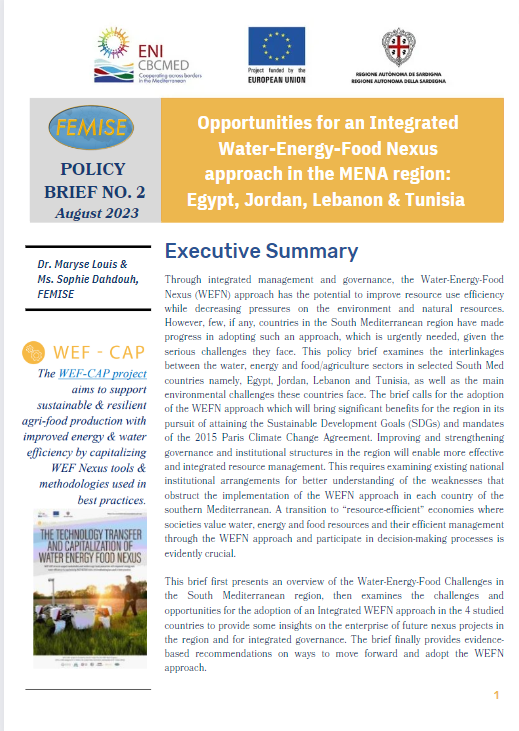
Many countries suffer from water scarcity as the whole Middle East and North African (MENA) region is considered the most water-scarce region in the world, with 18 out of the 22 countries of this region below the renewable water resources scarcity annual threshold of 1,000 m3 per capita per year. The shortage of freshwater in the region is aggravated by reliance on transboundary water resources, poor water quality, barriers to accessibility due to occupation and conflict, climate change, inefficient use of water (with agriculture already consuming almost four fifths of the region’s freshwater) and rapid population growth. At the same time, the region is faced with serious threats with regards to its food security.
Countries of the region depend heavily on imports of their cereals, which are witnessing soaring prices due to the war in Ukraine, while they have to deal with crop failures and overall yield reductions due to extreme weather conditions. According to FAO, the number of severely food insecure people in North Africa has increased from 21.1 million in 2019 to 28.3 million in 2021. Even more, those that are facing moderate food insecurity have increased from 48.7 million in 2019 to 57 million in 2021. Not to mention that energy consumption in the region has more than doubled between 1971 and 2011 and continues to increase.
These challenges when combined with soaring energy prices will have significant repercussions on the population and economic development if not addressed quickly. This is raising an alarm that SMCs need to find solutions to meet the growing demands from natural resources and securing food sustainability by taking into account the interlinkages between water, energy and food security.
The second Policy Brief, which is produced as part of the series of Policy Briefs undertaken in partnership between FEMISE, RSS, ANPE, CRES, UNICT, UAB and ECITD in the WEF-CAP project, is entitled: Opportunities for an Integrated Water-Energy-Food Nexus approach in the MENA region: Egypt, Jordan, Lebanon & Tunisia by Dr. Maryse Louis & Ms. Sophie Dahdouh, FEMISE. Download The full Policy Brief 2 in English- & Download the full policy brief in Arabic
Executive Summary:
Through integrated management and governance, the Water-Energy-Food Nexus (WEFN) approach has the potential to improve resource use efficiency while decreasing pressures on the environment and natural resources. However, few, if any, countries in the South Mediterranean region have made progress in adopting such an approach, which is urgently needed, given the serious challenges they face. This policy brief examines the interlinkages between the water, energy and food/agriculture sectors in selected South Med countries namely, Egypt, Jordan, Lebanon and Tunisia, as well as the main environmental challenges these countries face. The brief calls for the adoption of the WEFN approach which will bring significant benefits for the region in its pursuit of attaining the Sustainable Development Goals (SDGs) and mandates of the 2015 Paris Climate Change Agreement. Improving and strengthening governance and institutional structures in the region will enable more effective and integrated resource management. This requires examining existing national institutional arrangements for better understanding of the weaknesses that obstruct the implementation of the WEFN approach in each country of the southern Mediterranean. A transition to “resource-efficient” economies where societies value water, energy and food resources and their efficient management through the WEFN approach and participate in decision-making processes is evidently crucial.
This brief first presents an overview of the Water-Energy-Food Challenges in the South Mediterranean region, then examines the challenges and opportunities for the adoption of an Integrated WEFN approach in the 4 studied countries (Egypt, Jordan, Lebanon and Tunisia) to provide some insights on the enterprise of future nexus projects in the region and for integrated governance. The brief finally provides evidence-based recommendations on ways to move forward and adopt the WEFN approach.
Structure
- Introduction
- Water-Energy-Food Challenges in the South Med region
- Challenges and opportunities for a MENA WEF Nexus approach
3.1. EGYPT
3.2. JORDAN
3.3. LEBANON
3.4. TUNISIA
- Conclusion et recommandations
WEF-CAP PROJECT
https://enicbcmed.eu/projects/wef-cap
Twitter: @WefCap
Facebook: Wef-Cap Project
Copyright notice: Copyright © WEF-CAP.
WEF-CAP (THE TECHNOLOGY TRANSFER AND CAPITALIZATION OF WATER ENERGY FOOD NEXUS) is a project part of the ENI CBC MED Programme supported by the European Union through the Grant Agreement nº C_A.2.1_0069 running from 1st of September 2021 to 31th of August 2023.
This document is provided by the copyright holders and contributors « as is » and any express or implied warranties, including, but not limited to, the implied warranties of merchantability and fitness for a particular purpose are disclaimed. In no event shall the copyright owner or contributors be liable for any direct, indirect, incidental, special, exemplary, or consequential damages (including, but not limited to, procurement of substitute goods or services; loss of use, data, or profits; or business interruption) however caused and on any theory of liability, whether in contract, strict liability, or tort (including negligence or otherwise) arising in any way out of the use of this document, even if advised of the possibility of such damage. The ENI CBC MED Programme is not liable for any use that may be made of the information contained therein.


